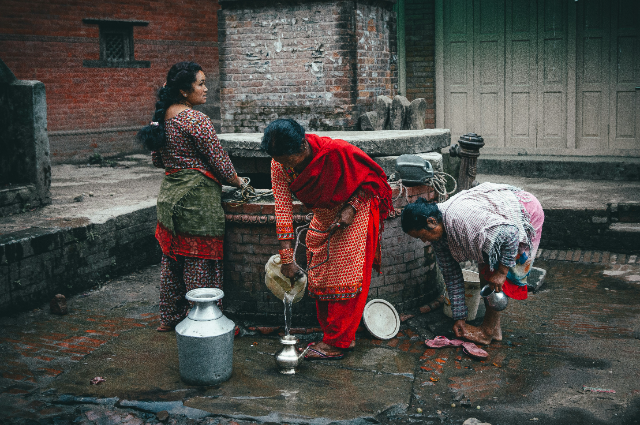
Water is the basic necessity of life. In today's time, humans are searching for water on other planets in the universe. But the irony is that humanity is facing a water crisis on Earth. The thirst and hunger of humans for more advancement is reaching a peak day by day, while at the same time, they are digging a deeper grave of extinction. The resolution of the UNO passed during the United Nations Water Conference in 1977 stated, "All people, whatever their stage of development and their social and economic conditions, have the right to access drinking water in quantities and of a quality equal to their basic needs." These words from the UNO mark the importance of water for life. Each and every nation should wake up to give access to all its citizens to clean drinking water. India is home to 17% of the world's population but has only 4% of the world's freshwater resources. In India, the water right has been protected as a fundamental right of any human being by the Indian Supreme Court as part of the Right to Life under Article 21 of the Indian Constitution. Despite the legal system and resolutions from international organisations, the fulfilment of water needs in India can be documented as almost negligible. In Indian culture, rivers are treated as sacred goddesses. The current scenario around the water crisis shows us a mirror and a deeply painful truth. We don't really honour the sacredness of our rivers. We don't truly worship their life-giving powers. But what we do is mindlessly use water and pollute the water bodies. The crisis is also a spiritual call to let the transformation happen from within. The water crisis in Indian cities is also a multidimensional problem rooted in urbanisation, climate change, mismanagement of water, and lack of education. It needs both systematic changes and citizens' consciousness. We often indulge in big debates, follow resolutions, and take huge pledges while neglecting the baby steps that we must take to protect the Earth from the water crisis.
- Awareness: The carelessness and unawareness of people towards the environment contribute significantly to the rising water crisis. There is a need to build environmentally friendly behaviour in people. Concerning the water crisis, inefficient habits, including leaving the tap water running and using excessive amounts of water, are the most common ways of water wastage. According to the data, millions of litres of water are being wasted every day worldwide.
- Lack of Education: Education empowers individuals with knowledge about the environment and the importance of sustainable practices. In places where the literacy rate is lower, people contribute more to harming the environment. Additionally, environmental education should be mandatory in all educational institutions to promote love for nature.
- Connection: With increasing urbanisation, people have lost their connection with nature and natural resources. There is a significant increase in the consumption and demand for water, along with increased pollution. This lost connection instils greed in humans, leading to a loss of responsibility and respect for the life-giving resource.
- Rainwater Harvesting: Storing rainwater could be reused for watering plants and cleaning vehicles. This can reduce the burden on clean water, which could be saved for drinking.
- Lack of Proper Infrastructure: Asking the right questions of the people responsible in the government also shows the cycle of awareness and education. The more people are educated, the more they will be aware, and the more they will question while simultaneously taking responsibility too.
Let's discuss some of the possible causes of the water crisis:
- Unplanned Settlements: The cities in India don't have proper architectural plans. The population explosion and the increase in the number of slums here and there, with no proper designs, contribute to the shrinkage and pollution of water bodies.
- Over-extraction of Groundwater: is over-extracted due to the increasing demand for drinking water.
- Pollution: One of the major causes of contamination of water bodies is the waste material from households and industries, both of which contribute equally to polluting the rivers.
Impact on Us
- Health: Due to these reasons, there are waterborne diseases. It degrades people's health and life. There is no sanitation, and many other health hazards.
- Environment: The environment gets affected, which in turn affects every life on the planet. The wetlands, rivers, and lakes are polluted.
- Economy: The scarcity of water heavily affects the economy. The marginalised urban population has to bear heavy consequences because of the water crisis.
Solution
- Integration: The integration of government policies with modern technology and people's consciousness is much needed to fight the water crisis.
- Sustainable Planning: The cities need good sustainable development. Rooftop harvesting and preserving greenery are essential.
- Participation: The participation of individuals, citizens, and communities is a crucial part of saving the country from the water crisis. There is a need for deeper understanding and awareness. The local population should be encouraged to monitor water use and stop any unwanted wastage. Some strict laws are also needed to make citizens more responsible.
The water crisis in Indian cities is both a problem to be tackled and a challenge to inspire us towards sustainability, environmental consciousness, and better living. The crisis can bring change, balance, and harmony. The environment is a collective responsibility of humanity, and planet Earth is home to all humans. We must all take responsibility for the protection of nature and natural resources. We all need to give up our egoistic approach towards the environment and follow a holistic path.
